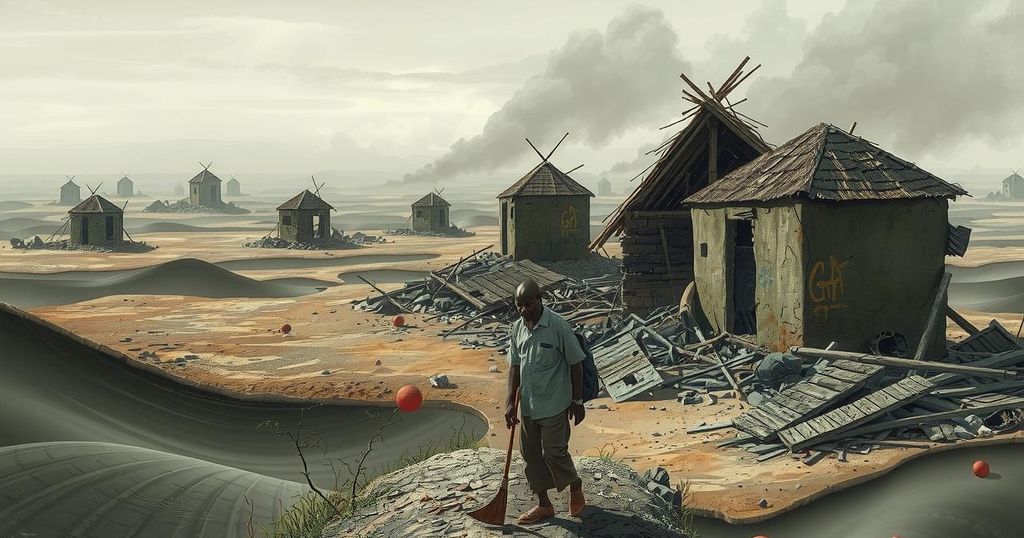Civilian Casualties Mount in South Sudan Amid Fighting Between Army and Local Militias

Civilian casualties in South Sudan are on the rise due to increasing fighting between the army and local militias. Airstrikes have devastated communities, resulting in numerous deaths and injuries, especially among women and children. The U.N. warns of a potential civil war as tensions escalate. Humanitarian efforts are hampered by ongoing violence, worsening an already dire situation for many civilians.
Civilian casualties in South Sudan are sharply rising due to escalating clashes between the army and local militias, particularly in areas near the border with Ethiopia. One particularly tragic case involves Wiyuach Makuach, 60, who was severely injured during an airstrike that targeted a hospital in Fangak on May 3. She recalls chaos, saying, “Everything was on fire,” as she desperately tried to save herself from the flames after losing an arm in the attack. The incident, which resulted in the deaths of seven individuals, is indicative of the growing violence plaguing the nation.
The South Sudanese army insists that it is targeting only combatants, yet civilian deaths and injuries are mounting. Makuach’s plight mirrors that of many others caught amidst the conflict. Gatkuoth Wie, 24, who was injured while defending his community, described how the army displaced families, forcing them to fight back. This unrest has triggered United Nations warnings about the potential for a new civil war in the country.
Meanwhile, in the U.S., there’s a separate issue brewing involving efforts to transfer a group of deportees to South Sudan. This group comprises individuals from various countries, all convicted of serious crimes, which has sparked legal challenges that even reached the Supreme Court. While these matters unfold, the humanitarian situation worsens on the ground. A temporary surgical response team from the International Committee for the Red Cross (ICRC) is set up in Akobo, assisting the influx of injured civilians.
Dr. Bjarte Andersen, a surgeon with the ICRC, noted the dangerous and challenging conditions for transporting critically wounded patients. He lamented, “We know of one person who has died waiting for transportation, but there are probably more.” The operational focus in Akobo has revealed a disturbing trend: an increasing number of victims are women and children, highlighting the indiscriminate nature of this violence.
One such victim is Kuaynin Bol, aged 15, whose life was shattered by a bombardment while he slept at home. He has undergone extensive surgeries to save his life. Tensions erupted into open violence in March, initiated by an attack from a militia group dubbed the White Army. Following this incident, the government accused opposition leader Riek Machar of inciting the unrest. In response, Ugandan troops were brought in to support military efforts against opposition fighters, escalating hostilities throughout the Greater Upper Nile region.
Isaac Pariel, from Machar’s opposition party, reported that at least 25 civilians have lost their lives this month alone, although the numbers are likely higher due to the remoteness of many affected areas. A recent bombing in Wichmon is reported to have taken the lives of 12 people, including 8 children. However, verifying such figures remains difficult due to inaccessibility and conflict.
As the army continues its operations, spokesperson General Lul Ruai Koang has refrained from commenting on specific actions taken in the military campaign. The continuous violence leaves civilians in a state of fear, compounded by ongoing humanitarian crises, with many fleeing at night to avoid aerial attacks. Residents like William Nyuon summed it up succinctly, “They fear the plane will come and bomb them again.”
Even as these violent events unfold, the implications for South Sudan’s people are severe, with many struggling amidst failure to secure basic living conditions plagued by severe food insecurity and illness.
The situation in South Sudan is increasingly dire, with civilian casualties climbing as violence spreads between the army and local militias. Accounts from injured civilians illustrate the devastating impact of airstrikes and the broader ramifications of conflicts on the humanitarian situation. As government forces escalate their attacks, the potential for a renewed civil war looms large, leaving many in fear for their lives amidst an ongoing humanitarian crisis.
Original Source: www.ivpressonline.com








